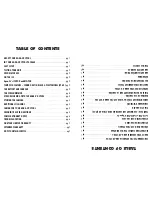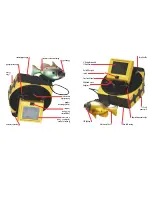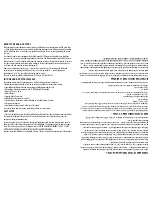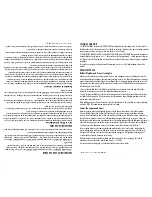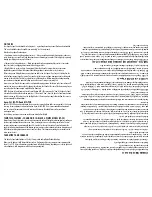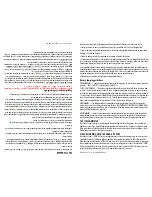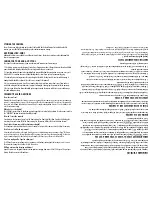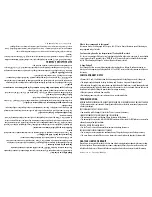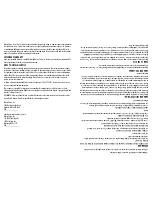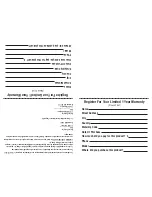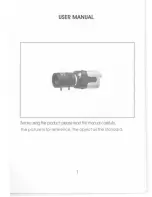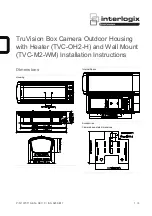
VÉRIFICATION DE VOTRE APP
AREIL
1. VISUALISATION D'UNE IMAGE. T
rouvez le commutateur ON-OFF-ON/LIGHT situé sous l'écran. Placez le commu
-
tateur à la position ON. Observez l'écran du moniteur
. Vous devriez apercevoir une image. Bougez la caméra
doucement en l'orientant vers des objets dans la pièce, votre chien ou même vos pieds. Vous devriez voir une
image "réelle".
2. VÉRIFICATION DES LUMIÈRES. Placez le commutateur ON-OFF-ON/lLIGHT à la position ON/LIGHT
. Choisissez un
endroit sombre. Une image de ce que la caméra "voit" - comme votre visage ou le mur du salon - devrait appa-
raître sur l'écran du moniteur. ( Notez bien: utilisez la position ON/LIGHT pour mettre en mar
che les lumières de
l'appareil Aqua-Vu Spool pour amélior
er votre visualisation durant la nuit ).
Si vous ne voyez pas d'image sur le moniteur suite à ces tests, référez-vous à la rubrique dépannage de ce manuel.
UTILISATION EN EAU LIBRE
Lests et DÉrive de Stabilisation
Les caméras pour la visualisation sous-marine peuvent être descendues sous l'eau à partir d'une jetée, d'un quai,
d'une embarcation ancrée ou d'un ponton. Ceux qui pêchent de la rive s'en servent aussi. La plupart des pêcheurs
en eau libre examinent le fond en dérivant, en pêchant à la traîne lentement en lac ou en utilisant le courant d'une
rivière. Pour ce type de visualisation en eau libre, la caméra peut être mieux maîtrisée en y fixant le lest et la
dérive de stabilisation pour la caméra qui sont compris avec l'Aqua-Vu Spool.
1. Alignez les trous du lest avec les trous déjà percés sous la caméra. Fixez le lest à la caméra à l'aide des deux
boulons de métal et des deux écrous de nylon.
2. Trouvez les deux trous déjà percés situés à l'ar
rière de la caméra et utilisez les deux boulons de nylon et les
deux écrous de nylon pour fixer la dérive de visualisation avant. ( La dérive de visualisation avant vous permet de
voir vers l'avant lorsque la caméra se déplace sous l'eau.)
Lorsque vous fixez la dérive et le lest à la caméra, vous remarquerez que les trous s'alignent. Les écrous de nylon
doivent être serrés à l'aide de pinces. NOTEZ BIEN: nous vous suggérons d'enlever le lest et la dérive lorsque vous
pêchez sur la glace.
Descendez la caméra et observez!
Débutez votre visualisation en descendant simplement la caméra sur le fond. Dans la plupart des plans d'eau, les
poissons se placent près des irrégularités du fond. En dérivant ou en pêchant lentement à la traîne, vous devrez
guider la caméra pour suivre le contour du fond. Vous appr
endrez rapidement à faire "évoluer" la caméra au-
dessus du fond. Avec le câble en main, r
elevez ou abaissez simplement la caméra en allongeant ou en raccourcis-
sant le câble selon la profondeur et la vitesse de l'embarcation. À mesure que vous progressez, vous devriez voir
sur l'écran du moniteur une image continue du fond et juste au-dessus, la zone fréquentée par les poissons.
Lorsque vous examinez un fond mou, assurez-vous que la caméra est au-dessus de celui-ci et qu'elle ne vient pas
en contact avec la boue ou qu'elle ne soulève pas des nuages de sédiments. Rappelez-vous que si vous n'apercevez
pas le fond, il faut descendre ou remonter la caméra pour l'apercevoir.
Soyez prudent lorsque vous utilisez la caméra près d'obstacles comme des roches ou des troncs d'arbre. Évitez de
tirer la caméra à travers des herbiers denses ou des broussailles. Si votre caméra s'accroche, manœuvrez l'embar-
cation pour que la traction soit dans le même sens que lorsque s'est produit l'accrochage. De légères tractions sur
le câble vous permettront ordinairement de faire reculer la caméra et de la décrocher
.
Lorsque vous utilisez votre Aqua-Vu Spool, vous ser
ez fasciné et souvent surpris par le paysage sous-marin varié:
des roches, des herbes et d'autres caractéristiques du fond - et des poissons !
( Pour d'autres conseils et des suggestions pratiques, consultez la rubrique "Questions fréquemment posées" dans ce manuel.)
Nature Vision, Inc. © Copyright 2000 Pg 2
TESTING YOUR UNIT
1. VIEWING AN IMAGE. Locate the ON-OFF-ON/LIGHT switch located below the viewing screen. Turn the switch to
the ON position. Look at the monitor screen. You should see an image. Slowly move the camera, pointing it towards
room furniture, your dog, or even your feet. You should see a "live" image!
2. CHECKING THE CAMERA’S LIGHTS. Turn the ON-OFF-ON/LIGHT switch to ON/LIGHT. Choose a dark environment.
An image of whatever the camera "sees" — like your face or the living room wall — should appear on the moni-
tor. (Note: Use the ON/LIGHT position to activate the Aqua-Vu Spool’s light source to enhance viewing in nighttime
conditions.)
If you fail to see an image on the monitor while conducting these tests, see the Troubleshooting section of this
manual.
OPEN-WATER USE
Ballast Weights and Front-viewing Fin
Underwater video cameras may be lowered into the water from breakwaters, docks, and fishing piers, as well as
from anchored boats and pontoons. Innovative bank fishermen use them, too. Much of the open-water viewing by
anglers is done from boats while drifting or slow trolling on lakes, or from boats dealing with stream current. For
best control of the camera in most of these open-water situations, use the Ballast Weights and Front-viewing Fin
included with your Aqua-Vu Spool.
1. Line up the predrilled holes of the ballast weights with those on the camera’s underside. Attach the Ballast
Weights to the camera by means of the two steel bolts and two nylon lock nuts.
2. Locate the two predrilled holes at the rear of the camera and use the two nylon screws and two nylon lock nuts
to attach the Front-viewing Fin. (The Front-viewing Fin helps maintain a forward-looking viewing posture as the
camera moves through the water.)
When attaching weights and fin to the camera, notice that the holes match. The nylon lock nuts require tightening
with pliers. NOTE: We recommend removing weights for ice fishing.
Lower the camera and view!
Begin your viewing trip by simply lowering the camera to the bottom. In most waters, fish relate to bottom
structure. While drifting or slow trolling, you’ll need to guide the camera over the ups and downs of bottom
contours. You will quickly learn how to "swim" the camera over bottom terrain. With cable in hand, simply raise or
lower the camera, paying out more or less cable depending on depth and boat speed. As you move along, you
should see on your monitor screen a continuous picture of the passing bottom and the fish-holding watery zone just
above it. When viewing over soft bottom, make sure the camera is actually above the bottom and not plowing or
"stirring up" the muck. Remember, if you can’t see bottom, raise or lower the camera to "look" for it.
Exercise caution when using the camera around submerged obstacles such as trees or rocks. Avoid pulling the
camera through heavy weed cover or thick brush. If your camera becomes snagged, maneuver the boat so the
direction of pull is the same as it was when the camera became snagged. A little jiggling or light tugging will
usually enable you to back the camera out of a snag.
With your Aqua-Vu Spool, you will be fascinated, and often surprised, by the ever-changing "live" view of
underwater scenery: rocks, weeds, other bottom features — and fish!
(For more advice and viewing tips see Frequently Asked Questions in this manual.)
Nature Vision, Inc. © Copyright 2000 Pg 2
Содержание SPOOL
Страница 1: ...SPOOL OWNERS MANUAL SPOOL OWNERS MANUAL ...


